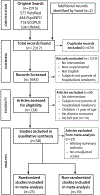Reducing parental trauma and stress in neonatal intensive care: systematic review and meta-analysis of hospital interventions
- PMID: 30659239
- PMCID: PMC7067599
- DOI: 10.1038/s41372-018-0310-9
Reducing parental trauma and stress in neonatal intensive care: systematic review and meta-analysis of hospital interventions
Abstract
Objective: To classify NICU interventions for parental distress and quantify their effectiveness.
Study design: We systematically reviewed controlled studies published before 2017 measuring NICU parental distress, defined broad intervention categories, and used random-effects meta-analysis to quantify treatment effectiveness.
Results: Among 1643 unique records, 58 eligible trials predominantly studied mothers of preterm infants. Interventions tested in 22 randomized trials decreased parental distress (p < 0.001) and demonstrated improvement beyond 6 months (p < 0.005). In subgroup analyses, complementary/alternative medicine and family-centered instruction interventions each decreased distress symptoms (p < 0.01), with fathers and mothers improving to similar extents. Most psychotherapy studies decreased distress individually but did not qualify for meta-analysis as a group.
Conclusion: NICU interventions modestly reduced parental distress. We identified family-centered instruction as a target for implementation and complementary/alternative medicine as a target for further study. Investigators must develop psychosocial interventions that serve NICU parents at large, including fathers and parents of full-term infants.
Conflict of interest statement
Figures



References
-
- Bonanno GA, Westphal M, Mancini AD. Resilience to loss and potential trauma. Annu Rev Clin Psychol 2011, 7: 511–535. - PubMed
-
- Boulais J, Vente T, Daley M, Ramesh S, McGuirl J, Arzuaga B. Concern for mortality in the neonatal intensive care unit (NICU): parent and physician perspectives. J Perinatol 2018. - PubMed

